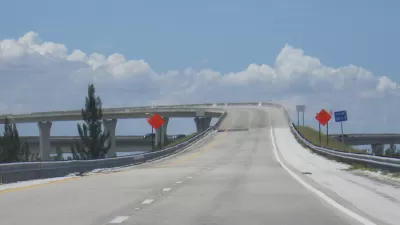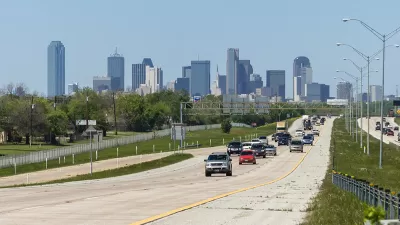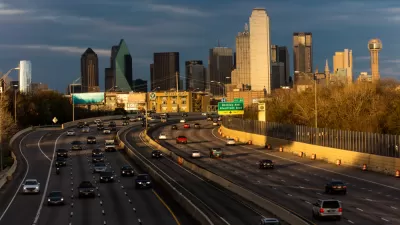Yonah Freemark critiques a planned expansion to Dallas' already-extensive highway network, arguing that it undermines billions of dollars in light rail investment and sets its downtown on a path of stunted growth.
For the home of the nation's longest light rail network, Dallas struggles with astonishingly low transit ridership – just 4.2%, according to data from the U.S. Census Bureau. In Freemark's view, that might just have something to do with the city's aggressive highway expansion policy.
For in addition to its extensive light rail system, Downtown Dallas is penetrated by seven grade-separated highways, and may soon see the addition of another. At roughly $1.5 billion, the new toll road is intended to relieve road congestion by building parallel to both existing highways and the new Orange Line, which will open this summer.
"This is transportation planning at its worst," Freemark opines. "Public dollars are being spent on two separate transportation projects that offer similar benefits and serve the same corridors. The advantages of the investments made in rail - namely, the ability to avoid congestion - are being marginalized by the construction of a huge new road that will, at least for a few years (until the congestion returns), make choosing the train a poor choice... And the result is that all this investment will again produce low ridership."
Proponents of the expansion argue that the toll road is critical to future growth, a claim that Freemark contends is misguided.
"Highways, by encouraging car use, make the walking, transit-oriented city impossible. The growth that Dallas has seen in its central areas could be ephemeral with the wrong decisions made."
FULL STORY: A Tollway in Dallas and the Absurdity of Building Duplicative Infrastructure

Maui's Vacation Rental Debate Turns Ugly
Verbal attacks, misinformation campaigns and fistfights plague a high-stakes debate to convert thousands of vacation rentals into long-term housing.

Planetizen Federal Action Tracker
A weekly monitor of how Trump’s orders and actions are impacting planners and planning in America.

San Francisco Suspends Traffic Calming Amidst Record Deaths
Citing “a challenging fiscal landscape,” the city will cease the program on the heels of 42 traffic deaths, including 24 pedestrians.

Defunct Pittsburgh Power Plant to Become Residential Tower
A decommissioned steam heat plant will be redeveloped into almost 100 affordable housing units.

Trump Prompts Restructuring of Transportation Research Board in “Unprecedented Overreach”
The TRB has eliminated more than half of its committees including those focused on climate, equity, and cities.

Amtrak Rolls Out New Orleans to Alabama “Mardi Gras” Train
The new service will operate morning and evening departures between Mobile and New Orleans.
Urban Design for Planners 1: Software Tools
This six-course series explores essential urban design concepts using open source software and equips planners with the tools they need to participate fully in the urban design process.
Planning for Universal Design
Learn the tools for implementing Universal Design in planning regulations.
Heyer Gruel & Associates PA
JM Goldson LLC
Custer County Colorado
City of Camden Redevelopment Agency
City of Astoria
Transportation Research & Education Center (TREC) at Portland State University
Jefferson Parish Government
Camden Redevelopment Agency
City of Claremont





























